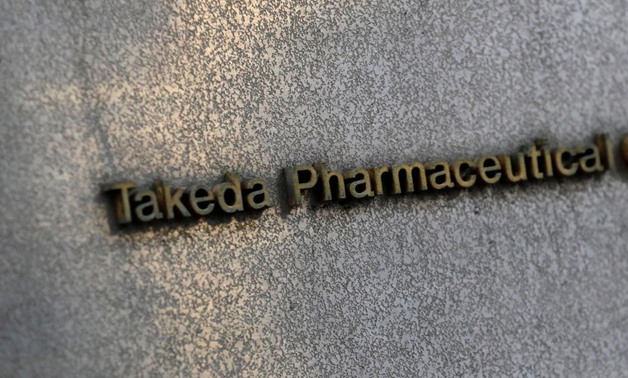
FILE PHOTO: Takeda Pharmaceutical's signboard is seen on its headquarters building in Tokyo, Japan January 30, 2018. REUTERS/Kim Kyung-Hoon/File Photo
LONDON/NEW YORK/TOKYO - 25 April 2018: Rare disease drug maker Shire Plc said on Tuesday it was willing to recommend a sweetened $64 billion offer from Japan’s Takeda Pharmaceutical Co to shareholders, in what could be the biggest acquisition of a drug company this year.
But shares in Takeda tumbled further on Wednesday, losing 7 percent as investors fretted over its ability to buy a company twice its size. Its stock slide - 18 percent since the news of a possible bid broke - also makes the cash-and-share deal less appealing to Shire shareholders.
The latest development, first reported by Reuters, comes after London-listed Shire rejected four previous offers from Takeda and will leave Shire shareholders owning half of the combined company.
The fifth offer is worth 49.01 pounds per share, comprised of 27.26 pounds per share in new Takeda shares and 21.75 pounds per share in cash.
That represents a 4.3 percent premium to Takeda’s fourth proposal on April 20 and an 11.4 percent premium to its first approach on March 29.
Shire, a member of Britain’s benchmark FTSE 100 stock index, said its board agreed to extend a Wednesday regulatory deadline to May 8 so Takeda can conduct more due diligence and firm up its bid. Shire added the deadline may be extended further if needed.
Any deal is subject to the resolution of several issues, including completion of due diligence by Shire on Takeda, the Dublin-based company said.
A deal would significantly boost Takeda’s position in gastrointestinal disorders, neuroscience, and rare diseases, including a blockbuster hemophilia franchise.
If successful, it would be the largest overseas acquisition by a Japanese company and propel Takeda, led by Frenchman Christophe Weber, into the top ranks of global drugmakers.
Weber, who became Takeda’s first non-Japanese CEO in 2015, has said publicly it was looking for acquisitions to reduce its exposure to a mature Japanese pharmaceutical market.
FINANCIAL STRETCH
The combined company would have its primary listing in Tokyo and also offer American Depository Receipts - a move which will give Shire investors an opportunity to cash out more easily.
But the transaction would be a huge financial stretch, and Takeda investors have been skeptical about the merits of a Shire deal, given the size of the potential purchase and concerns that a large share issue will be needed to fund it. Ambitious cost cutting is also seen as necessary to make the deal pay.
“Takeda’s shares have been valued for their stability and relatively high dividend,” said Daiwa Securities analyst Kazuaki Hashiguchi, adding that this made them attractive even to investors without specialist knowledge of the drug sector.
By contrast Shire is a much less stable prospect, leading to anxiety among some investors, he said.
Takeda, now worth $33 billion by market value, had 466.5 billion yen ($4.3 billion) in cash and short-term investments as of end-December. It said on Wednesday it intended to maintain its dividend policy and investment-grade credit rating following the deal.
Dealmaking has surged in the drug industry this year as large players look to improve their pipelines. A Takeda-Shire transaction would be by far the biggest.
Shire has long been seen as a likely takeover target.
Botox-maker Allergan Plc said last week it was considering making a rival offer, only to scrap it hours later due to pushback from shareholders. Shire was also nearly bought by U.S. drugmaker AbbVie Inc in 2014, until U.S. tax rule changes caused the deal to fall apart.
Shire traces its roots back to 1986, when it began as a seller of calcium supplements to treat osteoporosis, operating from an office above a shop in Hampshire. Since then it has grown rapidly through acquisitions to generate revenues of about $15.2 billion last year.
But it has been under pressure in the past 12 months due to greater competition from generic drugs and debt from its $32 billion acquisition of Baxalta in 2016, a widely criticized deal.
It announced last week a sale of its oncology business to unlisted French drugmaker Servier for $2.4 billion.
($1 = 0.7170 pounds) ($1 = 108.8200 yen)


Comments
Leave a Comment